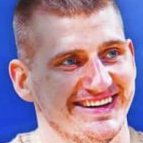LeBron vs Jordan - tak na poważnie
Ignorując pierścienie i zespołowe osiągnięcia, lepszy był
187 użytkowników zagłosowało
-
1. Ignorując pierścienie i zespołowe osiągnięcia, lepszy był
-
Jordan
-
LeBron
-
ten sam tier
-
- Aby zagłosować w tej ankiecie, prosimy się zalogować lub zarejestrować.
-
Ostatnio przeglądający 0 użytkowników
- Brak zarejestrowanych użytkowników przeglądających tę stronę.



Rekomendowane odpowiedzi
Jeśli chcesz dodać odpowiedź, zaloguj się lub zarejestruj nowe konto
Jedynie zarejestrowani użytkownicy mogą komentować zawartość tej strony.
Zarejestruj nowe konto
Załóż nowe konto. To bardzo proste!
Zarejestruj sięZaloguj się
Posiadasz już konto? Zaloguj się poniżej.
Zaloguj się